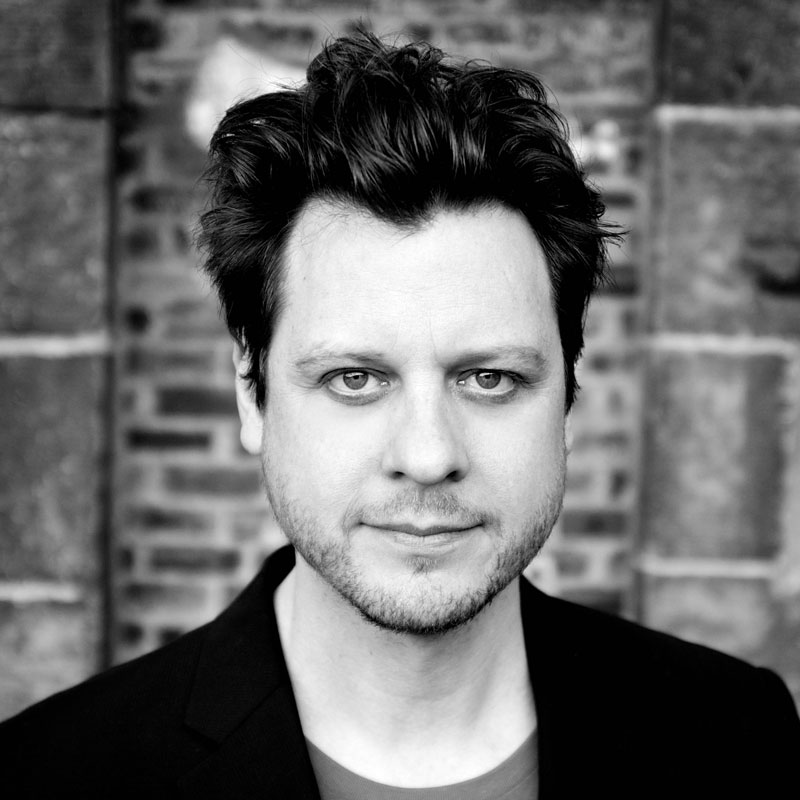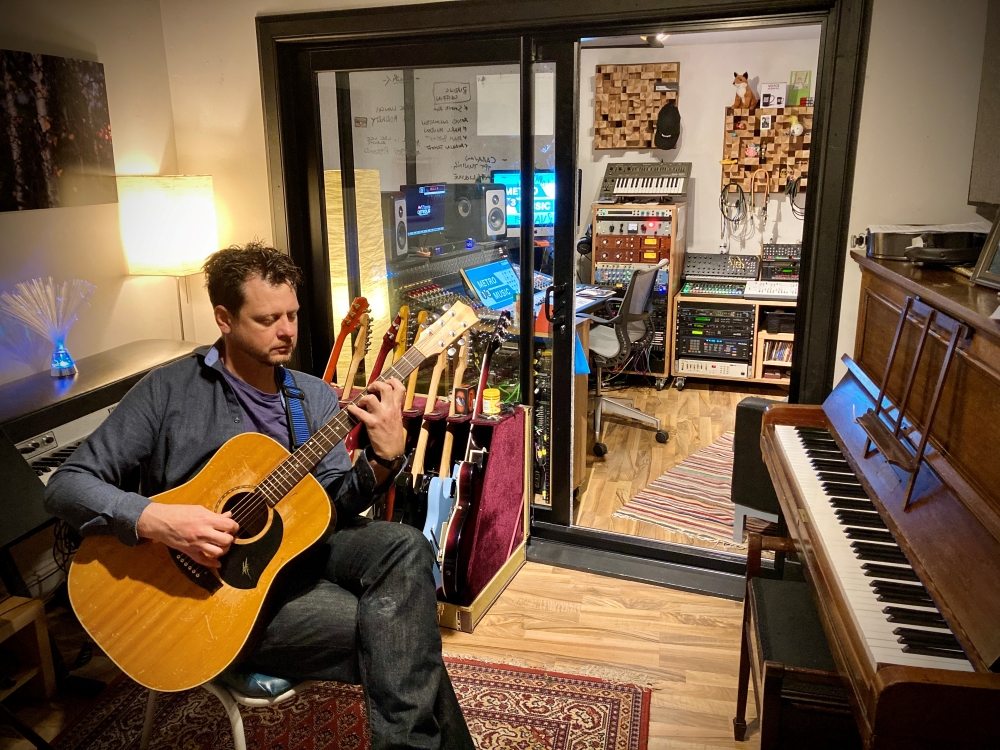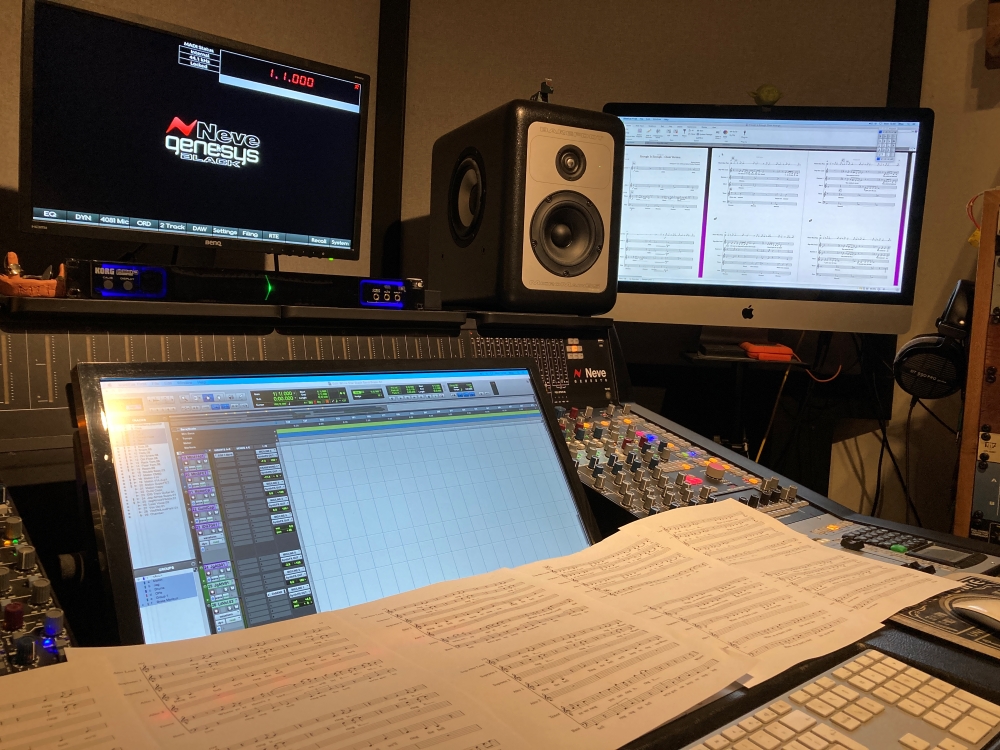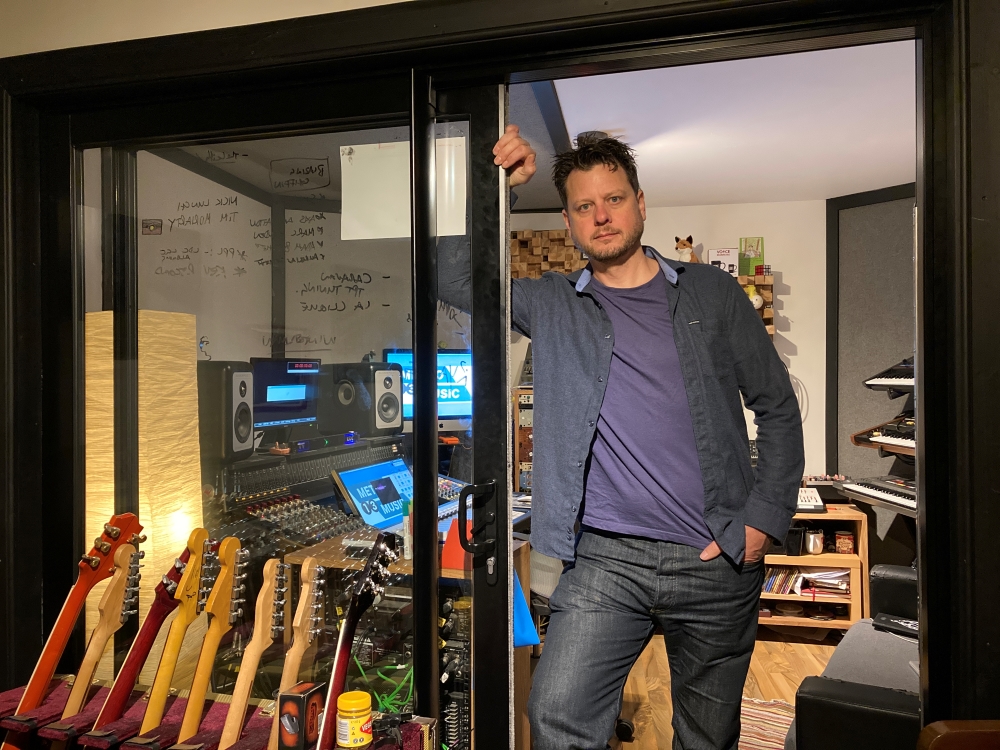22 Sep Studio Time, Stadium Gigs & Rubbing Shoulders with Nelson Mandela: Meet Marty Hailey
We caught up with award-winning composer, producer and touring musician Marty Hailey. Meeting Nelson Mandela!? That’s just one of many highlights in this illustrious musical career.
The Interview
Melodie: Hey Marty, thanks for chatting with me today! What have you been working on lately?
Marty: Pleasure, Selin. This is actually a nice, much-needed break from work for me.
I’ve just finished producing an album for a fantastic young singer/songwriter from Edinburgh called Sophie Penman – she’s amazing. She’s got piano grades, plays the guitar, has been writing songs since she was 12 and has the most unbelievable voice, really magical. I’ve just completed the record that’s going to mastering this week, so that’s been quite fun!
There’s another artist from Edinburgh called Katherine Aly, I’ve been doing some work for her which has been getting placed on the BBC, which is great. She actually just had an amazing video drop for the new single we wrote and produced! Her last single Glow and Ignite was chosen Single of The Week on BBC Radio Scotland in July. I’ve actually just received a call from her for another set of recordings, so that means more interesting work is on its way.
Writing-wise, it’s been a busy year – I’ve done a few things for Melodie, which have been very fun. I’m working on a lot of production stuff at the moment, lots coming!

Sounds like you always have multiple projects that you’re working on at the same time, which is very nice – keeps it fun & interesting!
I guess music has always been like that for me. I started off by playing, but even when I was younger, back in high school, I was always interested in the technology and production side of music, I’ve always liked that. They go hand in hand but also doing this as your full-time job, you have to pivot to different things. I have found myself working in theatres, touring with bands, making records or writing film scores. I never say no to working on and with music. I’m grateful for the breadth of opportunities that I have, and the variety is great.
Also, they do all feed into other things. Working on the arrangement side of music definitely covers all the work that I do, not just the shows but also writing scores and having an understanding of how things fit together, how voice leading works etc. The same goes for the production side of things – if I arrange a string section or brass for a record, they all fit together.
That’s not to say there’s no repetitiveness in working in music though. Like with any other job, you have different personalities that you need to manage. When producing for the same show over a long period of time, the show might not have any scope for improvising or bringing your own style to it, which can get repetitive. Of course, being a freelancer and working for yourself also means you have to generate your own work, but overall it’s still very fun!
You’re definitely right… It sounds like the variety of projects you eventually get to work on make up for the occasional repetitiveness though! So how did you get started in music?
I first got started in music, like a lot of kids growing up in Australia, by playing the recorder. I grew up going to church, and my parents bought a small electronic keyboard when I was 9-10. It was a tiny little Yamaha. Coming home from church, I was working out the melodies pretty quickly, and my parents realised that.
I also remember being in the cinema – we had just moved to Australia from the UK, and we went to see Fantasia. This is actually my earliest ever memory – I remember the very first piece was Bach’s Toccata and Fugue in D minor, which got me intrigued. I was also very interested in music and screen working together. The journey definitely started with that electronic keyboard though!

How did you get into writing music for picture then?
The first proper paid job I had for writing for picture was a documentary in the early 2000s called Renewing Women’s Business, and it was about a woman called Lily Gin Gina who was the last full blooded female elder of the Wardaman people from The Kimberley in Northwest Australia. It was a very interesting job because not only did I have to get approved, you know, as a ‘white fulla’ living in Sydney, but also a lot of the images were of sacred women’s business and sacred sites, so I had to get approval for looking at those photos. It was an amazing project to work on.
I also did some music for a Channel 7 show called Auction Squad in the early 2000s. There were some other small projects that I worked on prior to that, but these were the first two proper jobs writing for screen, which started it all!
What was the first album you bought?
The first single I bought was the theme from The Wombles. The first cassette I bought was from Kiss – a must!
What is the best thing about being a composer, producer & musician?
It’s the people – I’ve met some amazing people throughout my career. Alongside that, if I’m doing a job I really believe in, being able to express your thoughts – whatever you might be feeling – is one of the best aspects of being a composer, producer and musician that you don’t necessarily get to experience in a number of other careers.
Definitely – the creative freedom you get to have on a daily basis working with music is fantastic. Can you take us through your writing process?
Gosh, it really varies. If I’m writing for screen, I’ll get the script, read it and chat with the directors about it. Then I’ll start getting some theme ideas together around that. Quite often, I’ll have melodic ideas that pop into my head, and I’ll develop them.
It actually depends on the job. Sometimes, I’ll have a director who wants something quite atmospheric, so the composition process becomes less about the notes on the page, and more about the synthesisers and building sounds.
I did a piece for a BBC Scotland show a year and a half ago, a comedy about people in rehab. For the outro piece, I got bottles, filled them with water and then tipped them out to tune them. So, I wouldn’t say my process is strict. Some people are quite regimented in how they do it. I think I am disciplined but how I get started changes, and once it’s going, I follow whatever is developing.

Where do you take your inspiration then?
From a lot of stuff from the past. I love certain eras of music – the Beatles, a lot of the 60s music. In terms of the production side of things, I always get inspired by the work that George Martin did, helping them realise those songs and develop those amazing new ideas. Beach Boys as well. Classical music is a big thing for me as well, I studied Classical Guitar for a while.
Other inspirations can depend on the job. I was doing some work for the cancer care centres in the UK called Maggie’s Centres. Every time I was visiting a centre, the buildings were architecturally beautiful. These short films were being made about the buildings, creators and the impact they have on the patients. The buildings were always built by amazing architects, so quite often I would go there and try to look for rhythms in the buildings. There was one in particular, in Lanarkshire in Scotland, where the ratios of the walls and their designs were very mathematical. I met the architect and chatted about the rhythmic patterns that he used in the design of the building. So I literally took those and transposed them into a piece of music for the film.
So I guess it kind of varies. Inspiration can sometimes just come by sitting and being quiet, waiting for the inspiration.
That’s very creative! Do you ever get a block in terms of coming up with melodies?
Definitely! It can be quite common to get a block when you’re working to a deadline. Whenever that happens, walking is my go-to solution. Scotland is amazing for walking. I live near the beach here in Edinburgh, so if I’m ever feeling stuck, I go down there. You get near water, especially waves, and it’s all good.

Sounds therapeutic! What’s your go-to DAW?
I’m a Pro-Tools user, and I have been for 23 years. I worked for a studio down in London for quite a while. They were using Logic, so I used it for a while too. Pro-Tools is definitely my #1 choice though – editing is very fast and it handles large projects in terms of its file management very well.
For scoring, I use Sibelius, which is what I’m used to – it’s easy to use.
What keeps you busy outside of music?
Doing the accounts haha 🙂
Cooking, being at home. The area I moved to has a little community band of amateur musicians, which has been quite fun. We go out and play, very nice.
Who is your favourite band/artist, why?
Tough question, but I’m going to go for an American guitar player Bill Frisell, who is just fantastic. The way he approaches music and the guitar is a melting pot of different American styles of music. His background is jazz, but there is a huge amount of country, Americana, surf music etc. He blends all these things together and has a very unique sound. As soon as you hear his music, you know it’s him. Compositionally too, he writes really interesting, beautiful tunes. He’s pretty wonderful. Do check him out.
I definitely will! What has been the highlight of your 20+ years in the music industry?
In the 2000s, I was working with a band in Australia called Lo-Tel, we had a single that was placed in a movie and was doing well. We were touring a lot, and two cool things happened. One was playing to 100,000 people, which is a brilliant experience, but in the same year, we had a concert in Melbourne at the big stadium, and I got to meet Nelson Mandela in that concert! In terms of things that music has brought to my life, meeting Nelson Mandela has got to be the highlight.
In terms of a musical highlight, I think it’s the first time I heard my music in cinema. It’s a pretty cool feeling that can’t really be replicated.
Favourite track of yours in the Melodie library and why?
There is a tune called I’ll Wait Up All Night from a Dark Country set I did. That’s got to be my favourite – melodically it’s very nice, catchy and a bit melancholy.
Great track. Thanks for your time Marty 🙂


